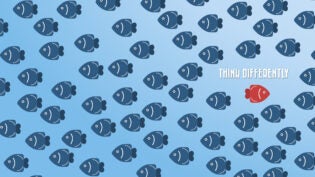
This is a story about Randy and Dave (R&D).
Today, Randy runs a small startup that has about two months’ worth of cash left, and he’s more than a little nervous.
Dave works for a huge, famous worldwide company that is doing the same thing today as it did when your grandpa was a client, and he’s really excited. (You’ll understand why in a minute.) But as you’ll see, he is nervous as well.
Randy does lots of research. It comes naturally to him; and besides, he has to. He knows if he doesn’t, he’ll deplete the little money he has left in the bank. So he invests almost every ounce of his energy testing, prototyping and failing forward. He understands that if he moves with agility and empathy, responding to market feedback, he may get to a product that people will buy. He’s quickly running out of time and cash, so he tests and listens with a vengeance. He’s making great progress and believes he’s nearing a breakthrough! But belief doesn’t help you pay the mortgage. All he has to show for his efforts so far is a dwindling bank account and his nerves, which grow more frayed by the day.
Dave’s life has suddenly changed. For decades, his team didn’t have to do too much research because his company knew how they make money. They devoted a finite amount of money annually to tweak their offerings so the company could continue to make money as it always had. Development and introduction of incremental improvement was easy. Creating new things was not so important.
Then one day, Dave heard his bosses were nervous because profits had started to slip.
To augment the incremental improvements to their existing product line, senior management started an internal venture fund, thinking they could invest in early stage startups that might be able to bolster the business and its profits. Besides, nobody wants to be “Ubered.”
They are ready to back multimillion-dollar investments in startups in hot areas like big data, disintermediation, driverless gadgets, telematics, the sharing economy and, ironically, anything that is really similar to their existing business but involves an app. Because all this stuff is new and in theory falls under Dave’s purview, he was put in charge.
Dave’s team is now the envy of the firm. They spend as much time as possible in Silicon Valley and in New York learning about disruption and hearing about the end of days (The robots are coming! The robots are coming!). Dave now knows his way around every rooftop martini bar and startup incubator. He even gets to meet with members of Congress who love those “entrepreneurial companies.” If you have a piercing, a tattoo and an MBA from Stanford, Dave wants to have lunch. Experts have told him that he needs to invest in 20 companies to hit one “unicorn.”
Those Were the Days
Boy, have times changed. Back in college, Randy was the yin to Dave’s yang; they completed each other. Randy had a knack for giving Dave the advice he needed and point him in the right direction––just in the nick of time. They seemed to slow each other down just enough to have a great insight and create a winning strategy.
Armed with Randy’s advice, Dave would take calculated risks, and his gambles always seemed to work out. Randy knew he’d never take those risks alone, so he enjoyed watching his partner in crime make a great plan come together. Needless to say, they charmed a lot of ladies and went on a lot of dates. They were a great team!
That was then; this is now.
Randy and Dave have drifted apart. They didn’t mean to; life just happened and they went their separate ways. Surprisingly, neither seems to notice that things aren’t working out like they used to. Randy has unbelievable ideas and insights but doesn’t have what it takes to make them real on his own.
Dave now has the experience and cash to change the world but is all over the place. On his own, he can’t seem to focus on the things that would make the biggest impact.
Randy needs Dave, and Dave needs Randy.
But they are too busy to notice. The future is coming faster and faster, which pushes them to act without each other. Sadly, neither of them have had the realization that together they could change the world; but apart, they are impotent.
(Since this is the moral of our parable, it is worth repeating.)
R&D: Apart they are impotent.
A tremendously bright future awaits for large companies that learn how to marry their financial, distribution and brand dominance with the impatience, empathy and fearlessness of entrepreneurs. I’ll call it the incubator of the future, and it will operate independently and many, many miles away from the corporate governance of the mother ship. In that magical place, R&D will disrupt the very industry that is funding them.
In the end, Randy and Dave will be back together, much to the delight of shareholders and entrepreneurs everywhere.
The question is, will they be working for your company?












